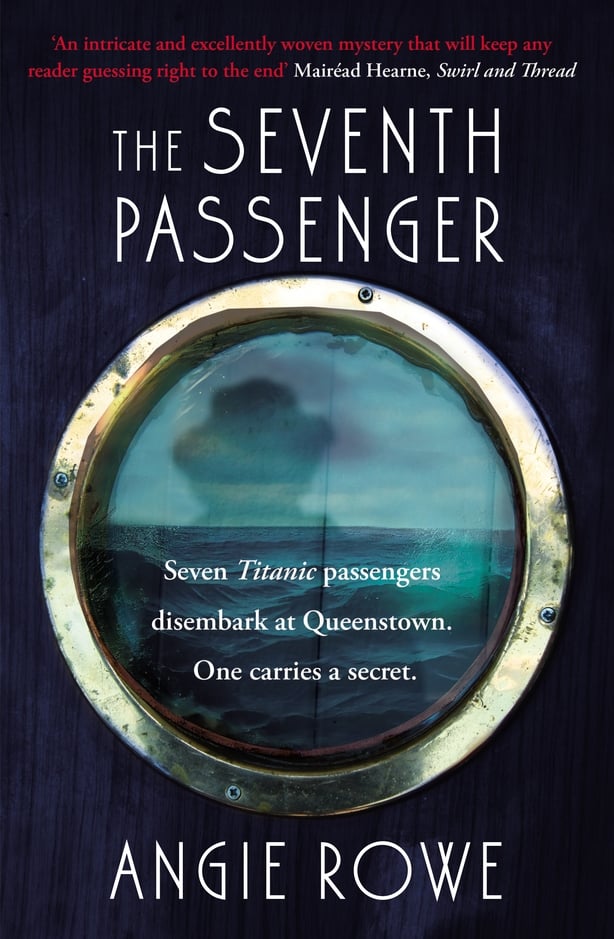We present an extract from The Seventh Passenger, the new 'historical whodunnit' by Angie Rowe.
When the Titanic sinks it takes with it the crime scene, the witnesses and possibly the murderer. The Titanic's last stop is at Queenstown, Ireland, where seven first-class passengers disembark. Soon after continuing its voyage, the body of a man linked to the doomed liner is fished from the water - murdered. With the crime scene now at the bottom of the ocean, District Inspector Lorcan O'Dowd's only clue to the identity of the killer is through the seven passengers. He follows their trail to London and China, slowly piecing together the life of the dead man. A woman is charged with murder, but O'Dowd isn't convinced. He's determined to find the real killer.
Later, when asked, not one of them could remember much about the woman. They'd been aware of her in a vague sort of way, and all agreed that a mourning veil covered her face, but their attention had been on the ship.
Seven first-class passengers disembarked at Queenstown that day.
As the tender cast off, the young priest and the boy focused their lenses on the ship. The April sun bounced on the sea, making it glitter like diamonds. The tender slowly pulled away and the water between them and the vessel widened. The priest and the boy clicked their shutters, trying to fit the giant ship into a small frame.
The last photographs.
The boy’s mother and aunt waved at the passengers on the ship’s deck. The woman with the mourning veil raised her arm and waved to someone. They didn’t notice to whom.
At the wharf, helping hands reached out to steady them.
A group of men ambled toward them. Cameras and notebooks in their hands. They wore the disinterested air of men who’d seen it allbefore. Reporters. They asked questions of the seven passengers. Had they enjoyed the Titanic? Why had they come to Ireland? They scribbled answers in their notebooks.
One of them tipped his well-worn bowler hat as he approached her.
'Your name, please? For the newspaper,’ he said. She was aware of glances from the other passengers. She felt trapped.
‘Amelia Nelson,’ she said, her voice low.
He licked the tip of his pencil and took a step closer, almost touching her.
‘And you’re travelling alone, Miss Nelson?’ The hint of a smirk on his round face.
She felt her temper rise. ‘Mrs. Nelson,’ she corrected him.‘And you’re here for –’
‘To join my husband.’ The words were out before she could stop herself. She knew instantly it was a mistake.
‘And his name would be?’ She took a breath. ‘Mr. Frederick Nelson.’
A porter arrived with her bag. She took it from him and pretended she didn’t hear the reporter say he had another question. She felt his eyes on her back as she walked away.
It’ll be all right, she told herself. It’s of no consequence. In a few days, the Titanic will be in New York. That’s where the newspapers will focus their stories.
No one will remember who got off the ship in Queenstown.

Youghal, County Cork, Ireland, April 12, 1912
He knew. Sergeant Mulcahy’s quick footsteps came toward his office and he knew something had happened. Probably something bad. The sergeant barely waited for him to say ‘Come in’ before he opened the door.
A boy’s voice hollered from the front desk. ‘Me da says he’s got to come quick!’
Sergeant Mulcahy jerked his head toward the boy’s voice. ‘Ned Dangan’s lad Danny, sir. There’s a body in the harbour and –’
‘I know. I’ve got to come quick.’ O’Dowd pushed the pile of paperwork on his desk to one side. ‘Who’s on this morning?’
‘Flanagan, sir. I’ve told him to get ready.’
‘Tell him to meet me out front in five minutes.’
A drowning. Inspector Lorcan O’Dowd hated drownings, but anything was preferable to updating the Register of Chimney Sweepers, or the Register of Public Houses, or the one he hated most, the Register of Evicted Farms. He was keen to go to the scene – but he was not a man to be rushed and certainly not one to jump at a
summons from a local fisherman. He forced himself to wait five minutes before he pulled his long body out of the chair, put on his tweed overcoat and dug his fingers deep into its pockets in search of a cigarette that he knew wasn’t there. He hoped Constable Flanagan smoked.
Eager, broad-faced with a snub nose, Constable Flanagan stood to attention when O’Dowd walked past. He didn’t look like a smoker.
‘Sir,’ he said, still standing to attention, ‘should I bring my carbine?’ O’Dowd paused, pursed his lips, and pretended to consider this for a moment.
‘No, constable, I think we’ll be safe enough to attend this incident unarmed. Pencil and notebook will be our only weapons today.’
They stepped out into the morning drizzle. It was less than a five- minute walk to the harbour. He could tell Flanagan was eager; they were all eager in the beginning, inclined to walk too quickly. All those hours marching does that to a man.
‘Steady, constable.’ O’Dowd spoke quietly. ‘It won’t do to arrive breathless and flustered. Rule Number One: You must always look as if you’re in complete control. Even if you’re not, as long as you look like you have everything in hand, you’ll earn the confidence of the people you’re dealing with.’
‘Yes, sir.’ The constable took a deep breath and measured his pace.
It could be a pleasant walk on a summer’s day, but this was only the middle of April. The sharp sea air and cold drizzle made their eyes water as they progressed along the quays toward the small harbour. This was where the River Blackwater and the sea merged and rippled in swirling currents across the bay.
A cluster of men at the far end of the harbour came into view. He could feel their eyes on him. O’Dowd slowed and looked down into vessels tied to heavy metal rings embedded in the grey stone harbour walls. He feigned interest in the contents of the boats. No harm in reminding the fishermen they could be searched at any time – gunrunning was rife along this coast.
O’Dowd knew he would never be accepted by the locals. No policeman would. He’d never be forgiven for being a member of the Royal Irish Constabulary. The locals saw the R.I.C as being at the bidding of the gentry, the largely absent landowners. That was unforgivable. Except on days like this when they needed the R.I.C. Then they had to, at least, be civil.

The Seventh Passenger is published by Poolbeg Press

